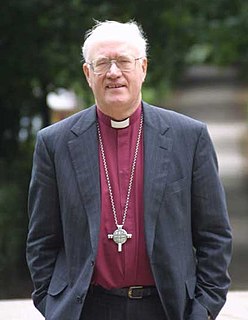A Quote by Samuel Taylor Coleridge
In your intercourse with sects, the sublime and abstruse doctrines of Christian belief belong to the Church; but the faith of the individual, centred in his heart, is, or may be, collateral to them. Faith is subjective.
Quote Topics
Related Quotes
A nominal Christian often discovers in suffering that his faith has been in his church, denomination, or family tradition, but not Christ. As he faces evil and suffering, he may lose his faith. But that’s actually a good thing. I have sympathy for people who lose their faith, but any faith lost in suffering wasn’t a faith worth keeping.
Belief is in a sense passive, an agreement or acceptance only; faith is active and positive, embracing such reliance and confidence as will lead to works. Faith in Christ comprises belief in Him, combined with trust in Him. One cannot have faith without belief; yet he may believe and still lack faith. Faith is vivified, vitalized, living belief.
Creflo Dollar is compromising, confusing or outright contradicting essential Christian doctrine. Joel Osteen does exactly the same thing. Now, not necessarily the exact same doctrines, but he is compromising, confusing or contradicting essential Christian doctrine. Their view of faith is a force, words are the containers of the force, and through the force of faith, one can create his or her own reality. That's not biblical faith. That's a false faith, or faith that doesn't satisfy and ultimately will lead people into harm's way.
We cannot have faith without belief, but we can believe without having faith. Belief is the foundation of faith. Faith is trusting in our Lord and Savior, Jesus Christ. The scriptures contain many assurances of salvation to those who exercise faith and obey the commandments... Faith is the motivating force that impels action.
Belief, as I use the word here, is the insistence that the truth is what one would "lief" or wish it to be. The believer will open his mind to the truth on condition that it fits in with his preconceived ideas and wishes. Faith, on the other hand, is an unreserved opening of the mind to the truth, whatever it may turn out to be. Faith has no preconceptions; it is a plunge into the unknown. Belief clings, but faith lets go.
Christian faith is exclusivistic. Christian faith lays claim upon our lives. The sanctity of life, what we do with a life, is very definitive in the Christian faith, what we do with sexuality, what we do with marriage, all of the fundamental questions of life have points of reference for answers, and people just have an aversion for that. That I think is the biggest reason they feel hostile towards the Christian faith.
Sometimes the sight of someone in one faith wrestling with that faith can empower you to wrestle with another faith. For me, it was reading about how the Catholic Church wrestled with itself in the 1960s. Pope John XXIII set Nostra Aetate - the Declaration on the Relation of the Church with Non-Christian Religions - in motion. It changed the relationship between Jews and Catholics. Today, Jews and Catholics meet as friends. If you can do that, after the longest history of hatred the world has known, that empowers you as a Jew or a Muslim to wrestle with your faith.
The confidence and faith of the heart alone make both God and an idol. If your faith and trust be right, then is your god also true; and, on the other hand, if your trust be false and wrong, then you have not the true God; for these two belong together faith and God. That now, I say, upon which you set your heart and put your trust is properly your god.
A living faith is always on trial; we call it faith for that reason. When I read in some alarmist book that the Christian faith is now on trial, or "at the crossroads," my impulse is to answer, Why Not? Does anybody know a time when the Christian faith was not on trial, or when the Christian life was a simple walkover, with neither principalities nor powers to dispute its advance?
And I profess still, that whatsoever the church of England (the church, I say, not every doctor) shall forbid me to say in matterof faith, I shall abstain from saying it, excepting this point, that Jesus Christ, the Son of God, died for my sins. As for other doctrines, I think it unlawful, if the church define them, for any member of the church to contradict them.
Faith is the avenue to salvation. Not intellectual understanding. Not money. Not your works. Just simple faith. How much faith? The faith of a mustard seed, so small you can hardly see it. But if you will put that little faith in the person of Jesus, your life will be changed. He will come with supernatural power into your heart. It can happen to you.







































